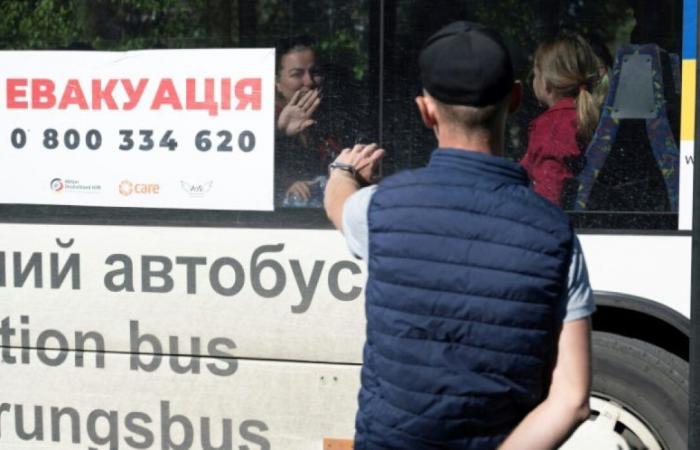Yuriï Kozynets kisses his wife in front of the bus taking her away from Pokrovsk, in eastern Ukraine, where Russian troops are inexorably approaching. Yuriï, 31, wipes the tears from the face of his wife Aliona Gladkaïa, 35. “There is no other solution: to protect his family, a man must provide for their needs,” he asserts. His wife and her three children from a previous marriage get on the bus and she presses her hand against the window. On the other side of the window, Yuriï does the same.
Like hundreds of men who have sent their families to the relative safety of other parts of Ukraine, he stays to work in the mine, harvesting the precious coal that Ukraine needs for its economy and defense. The heartbreaking choice highlights a common dilemma for Ukrainians living near the front who cannot afford to give up their jobs and move.
The story of Iouriï and Aliona began at the mine. She was responsible for bringing the workers to the surface and Yuriï gave her the token each time proving that he had finished his shift. Before parting, they replay the scene, laughing through tears. Aliona leaves heartbroken. “When I look at what has become a part of me, everything I have put my soul into, I lose all strength,” confides the woman, who does not know if she will ever be able to return.
Bombings. The Russian army, with its firepower razing everything in its path, is gradually approaching Pokrovsk, a key logistical node for Ukrainian forces in the Donetsk region (east), and is today less than 10 kilometers from the city. This advance is felt by incessant and increasingly heavy bombings which destroy buildings and frighten the children of Aliona: Kira, 13 years old, Anguelina, 12 years old, and Matviï, 9 years old.
Since the end of August, nearly 35,000 residents have left Pokrovsk, and only 13,900 remain, according to the municipality. Public transport almost no longer operates and only the shuttles transporting employees to the mine are still running.
While waiting for one of them, Andriï Radine, a 41-year-old worker, and his three colleagues say that most of the miners have sent their wives far from the city. “The mine shapes the city,” explains Andriï. “Without the mine and the railway, it would be over: people would have nothing left to survive,” he adds.
Vital role. Before the invasion, 8,500 people worked for the Pokrovsk mining company, according to Oleksandr Kalenkov, president of Ukrmetallurgprom, an association of metallurgical companies. It is not clear how many remain today. “At the moment, our industry is seeing the most difficult situation since the start of the war,” laments Mr. Kalenkov.
The Pokrovsk mine is the only Ukrainian-controlled mine producing coke, a coal needed to make steel. Its loss would be a “terrible blow” which would halve the production of this metal, essential to the military industry and costly to import, he believes.
The role of miners is so vital to Ukraine that most of them are exempt from military service and receive relatively high salaries. “I would not receive such a salary elsewhere,” confirms Andriï Radine, without revealing the amount. But even he plans to leave, the mine having been bombed several times.
“Damn thing.” In a neighboring neighborhood, Oleksandr Belenko, 41, waits for his turn at the barber to the sound of artillery fire. His wife, Lyoudmila, found refuge in Odessa (south) with their two children. “They are my family, my blood. I would give them my last piece of bread if I had to. And I’m not complaining, it’s not difficult for me. It’s simply every man’s mission to be a provider,” says Oleksandre, who also works at the mine.
“I want this damn thing to be over quickly. Honestly, I have no more strength,” he loses his temper about the war. His family members, who once lived nearby, are all in different cities. “Loneliness is hard,” he says.
Yuriï Kozynets tries to contain his emotion as he watches the bus take away his wife and adopted children. “I’m just afraid I’ll never see them alive again.” I hope… No, I’m sure, we’ll see each other again,” he pulled himself together. “She and the children are my whole life,” he adds.
Barbara WOJAZER
© Agence France-Presse






